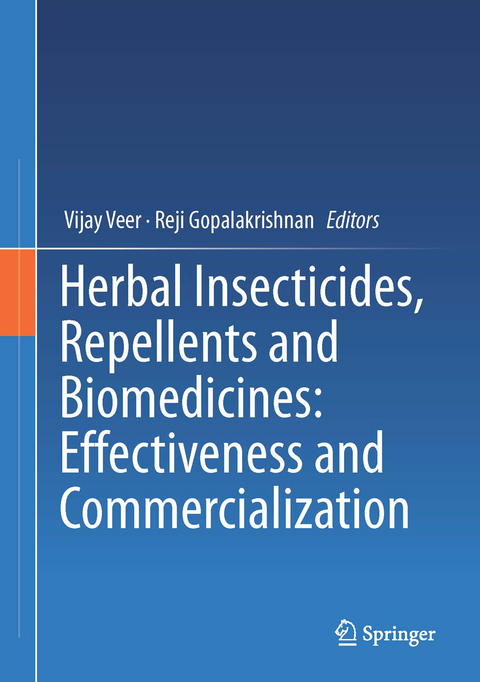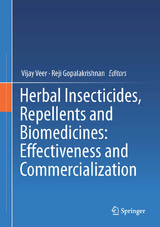Herbal Insecticides, Repellents and Biomedicines: Effectiveness and Commercialization
Springer, India, Private Ltd (Verlag)
978-81-322-2702-1 (ISBN)
This book looks closely at herbal product development and commercialisation. In spite of an ever-growing demand, there is a dearth of safe and effective herbal products that meet consumers’ expectations. Therefore, this book takes it upon itself to elaborate on the development process of herbal insecticides, repellents and biomedicines from a commercialisation point of view. The introductory chapters deal with the various strategies for disease vector control and provide an overview of herbal biomedicines. The subsequent chapter describes plants with mosquito larvicidal activity, including a comprehensive list of lethal concentrations against different mosquito species. The chapter on Himalayan plants discusses potential botanical insecticide sources and their chemical constituents before delving into the topic of natural insecticides of microbial origin and their efficacy against mosquitoes. Plant-derived insecticides belonging to different chemical classes and the extraction, purification and characterisation of bioactive compounds are illustrated, as well. The recent technological advances in the formulation of microbial, biochemical and botanical insecticides are also reviewed. Three chapters focus on important medicinal plants useful for treating human ailments, with special reference to the traditional healing practices of northeastern India. This is followed by a chapter on the production, use and safety of biopharmaceuticals and edible, plant-based vaccines. The intellectual property issues related to herbal products in India including patents, trademarks, geographical indications, trade secrets and traditional knowledge resources are plainly examined. The book ends with a chapter on the herbal product registration process in India, wherein the data requirements for registration, clinical efficacy trials, toxicity studies, quality control, packaging and labelling are clearly explained. In conclusion, this bookis a step-by-step guide for the development of safe, effective and commercially viable herbal insecticides, repellents and biomedicines.
Dr. Vijay Veer is a renowned defence Scientist who is well-known for his contributions to insect ecology, taxonomy and medical entomology. He has more than 38 years of research experience and has developed many products and technologies for the benefit of the armed forces. He has developed Defender Net, the first indigenous long lasting insecticidal net, which offers protection from malaria, Japanese encephalitis, dengue, filariasis and other insect borne diseases. His studies on pests of defence importance have led to the development of highly effective pest control products namely, Diethyl Phenyl Acetamide (DEPA – a mosquito repellent), Wool Care, Ratox, Roachtox and ovitraps. He has contributed immensely towards our understanding on forest pests, thrips, dermestid beetles and tabanid flies and has described many new insect genera and species. He has 25 patents, 8 books, several book chapters and over 155 research publications in national and international journals. He wasa member of GFAST, a DRDO think-tank, representing Life Sciences. He is presently the director of Defence Research Laboratory (DRL), Tezpur, India. DRL, under his able leadership, has successfully developed an array of products and technologies including Dentrap, Toxmos, Biotank cum reed bed system, Capsispray (chilli spray for self defence), Capsigrenade (chilli grenade for mob dispersal) and DrlPure (water purification unit). Currently he is pursuing the field of semiochemicals and molecular taxonomy.Dr. Reji Gopalakrishnan is a DRDO Scientist at the Defence Research Laboratory, Tezpur, India. He studied the simulation of insect population dynamics, pest damage on crop plants and pest-weather relationships during his masters and doctoral research at the Indian Agricultural Research Institute, New Delhi. He has more than 12 years of research experience in entomology and has one patent and many research publications in national and international journals. He is presently working on the development of disease vector monitoring tools and insect repellents. He has developed Dentrap, which is a trapping device for dengue, chikungunya, Japanese encephalitis and filariasis vectors and Toxmos, which is an aerosol formulation for application onto fabrics for personal protection from mosquitoes and other biting insects.
1. Advances in vector mosquito control technologies, with particular reference to herbal products.- 2. Sustainable and novel eco-friendly approaches towards integrated disease and vector management.- 3. Mosquito larvicidal potential of medicinal plants.- 4. Plants of Himalayan region as potential source of bio-pesticides for lepidopteran insect pests.- 5. Natural insecticides from Actinomycetes and other microbes for vector mosquito control.- 6. Extraction, purification and characterisation of insecticidal compounds from plants.- 7. Recent advancements in bio-botanical pesticide formulation technology development.- 8. Medicinal plants and phytomedicines.- 9. Prospects for development of biomedicines from the medicinal plants of northeastern India.- 10. Traditional anti-poison plants used by the Monpa tribe of Arunachal Pradesh.- 11. Molecular farming for production of biopharmaceuticals and edible vaccines in plants.- 12. Intellectual property rights Issues for herbal products.- 13.Regulatory approval of botanical products including herbal drugs, food and insecticides for commercialization.
| Erscheinungsdatum | 08.01.2016 |
|---|---|
| Zusatzinfo | 19 Illustrations, color; 89 Illustrations, black and white; XV, 258 p. 108 illus., 19 illus. in color. |
| Verlagsort | New Delhi |
| Sprache | englisch |
| Maße | 178 x 254 mm |
| Themenwelt | Medizin / Pharmazie ► Medizinische Fachgebiete ► Mikrobiologie / Infektologie / Reisemedizin |
| Medizin / Pharmazie ► Medizinische Fachgebiete ► Pharmakologie / Pharmakotherapie | |
| Studium ► Querschnittsbereiche ► Prävention / Gesundheitsförderung | |
| Naturwissenschaften ► Biologie ► Botanik | |
| Naturwissenschaften ► Biologie ► Mikrobiologie / Immunologie | |
| Wirtschaft | |
| ISBN-10 | 81-322-2702-6 / 8132227026 |
| ISBN-13 | 978-81-322-2702-1 / 9788132227021 |
| Zustand | Neuware |
| Haben Sie eine Frage zum Produkt? |
aus dem Bereich




